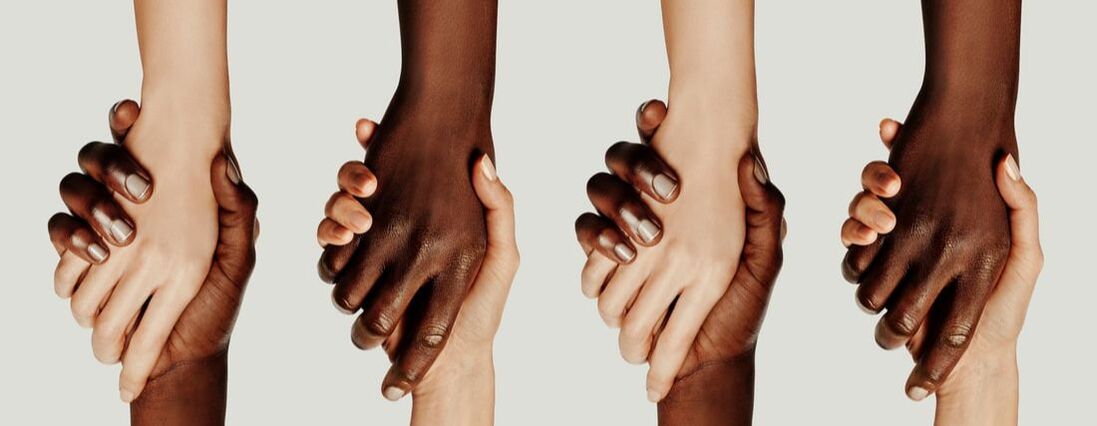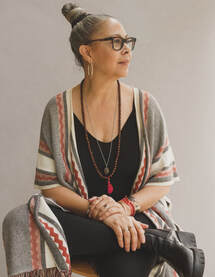|
"Life can only be understood backward but must be lived forward -Kierkegaard"
We are coming to the end of black history month. I have spent much of this month attempting to “locate” myself. You see, I am in the midst of reclaiming myself, and putting me together feels like a literal re-membering; it has required deep reflection, study and acknowledgement of the actual physical and metaphorical parts of me that have been cut off, long forgotten or simply dismissed. In fact, a recent conversation with a family member revealed they were surprised to hear that I identify as a black woman. This is not a new narrative to me; I have lived with this my entire life. The thing is, “I do identify with being black, and if people do not identify me that way, that is their issue. I am happy to challenge people's understanding of what it looks like to be biracial (Rashida Jones).” So, I am asking myself (and my family members) the big questions about my own history. Who were my people? Who are these ancestors that walk beside me? Who is it that I carry in my being? I am following Kierkegaard’s lead in that life can only be understood backward but must be lived forward. I am working on healing my ancestral lines. It is a dynamic and sometimes painful process. Part of my re-membering has been to look back in time and not only look at the alignment of the stars, but to reflect on the energetic climate of the world I was about to enter at birth. While there are many powerful black Canadians that I could reflect on, it is significant for me to imagine that at the time I was preparing to enter the world in April 1963, Martin Luther King Jr. was in jail, along with 50 other civil rights protesters. While in solitary confinement on April 16th, he penned the Letter from the Birmingham Jail one of the most important letters of his time, in the margins of a newspaper. It is the letter where he wrote, “injustice anywhere is a threat to justice everywhere.” Imagine that, while I was being birthed into existence in the wee hours of April 17th, Dr. King Jr. was writing about civil rights, equity, and inclusion. I believe that was the energetic climate I was entering at birth – it is in me. With the help of my family, I have been able to trace my ancestors back to Jamaica, 1855. Although I do not have many stories, there is one that sticks out as especially significant; my ancestors were enslaved people, but they also enslaved people. I wish I had more of the story to share with you, but from what I understand, the plantation owner was from England, he had sons with enslaved women, and then had to return to England. From what I can gather, when he returned to England, he left the plantation to his sons, and those men are my ancestors. In fact, before hearing this story, I had often joked that as a bi-racial person, I contain both the oppressed and the oppressor in this one body. Imagine, for a moment, the karmic imprint that living with this type of narrative leaves on the soul. These are the stories I carry in the tissues of my body. In the mid 1990’s, at the height of some profound anxiety attacks (ones where I felt I was going to die about 5 times per day for a year or so), I began to study Buddhism and Yoga. Although it did not happen overnight, anxiety is a distant memory. Over time the practices provided a sweet refuge for me and offered me a reprieve from suffering. The physical practice allowed me to move and remove blocked energy through and from my body, while the meditation practice gave me the discipline and structure I needed to work with my mind. From this, I developed a deep, compassionate commitment to myself, to my well-being, and to something beyond myself: the desire for freedom for all beings. You might be asking, what does my ancestral history have to do with Yoga or Buddhism? I think the bigger question we should be asking is, what does it mean for Black, Indigenous, or People of Color (BIPOC) folks to practice Yoga in predominantly white Yoga spaces, or spiritual communities? What does it mean for BIPOC folks to bring along an individual and collective history of racial trauma, and not be able to discuss the pain of that history within their spiritual community? As many of you know, we are often - in society and in spiritual communities - encouraged to bypass the ugly stuff. We do not see colour and we are all one, right!? Please, do not misunderstand me, at the “absolute” level I do believe we are all connected, but on the “relative” level, I am very conscious that we are in different bodies, with different skin, and are treated very differently based on this. I have spent the last few weeks taking workshops and listening to Dharma talks taught almost exclusively by black teachers. I am not going to lie; it has been refreshing to be part of a conversation that acknowledges a collective accounting of deep, deep pain. The racial type of ancestral pain. To be honest, I had no idea I needed this. I had no idea that we, as BIPOC folks, hold an individual and collective trauma so deep in our bones, we often do not even know it is there. I had no idea I needed to re-member parts of myself that I did not know were missing. How could I not have noticed that my arm, one of my eyes, my ear, or one of my kidneys was missing for all these years? Is this what it is like to live with internalized racism?? Attending these offerings was like being sewn back together, suture by meticulous suture, one beautiful and profound teaching at a time. I have been longing to have an honest conversation about Yoga and racial inclusion for a long time. So, I am throwing down the gauntlet, the glove, and the chicken foot! It is that important. If you are a Yoga studio owner, if you are part of a spiritual community, I urge you to open the type of dialogue that generates the heat of “tapas” – the tension and friction needed for change. Challenge your thinking around what racial inclusion means, what it truly looks like, and what you will do to make your spaces and teaching faculty more inclusive and representative of BIPOC. If you are not clear on how to start the conversation, I invite you to educate yourself. Attend workshops and read books by BIPOC facilitators and authors. Talk to your peers and colleagues about what, if anything, they are doing to become more accessible and inclusive. More importantly, develop relationships with the people and groups you want to include and find out what they need. Like all change, this conversation is not going to be comfortable, but this tension is needed to get us to where everyone has a place to practice in which they feel safe, welcome and at home. This time calls for more than silence and simply bearing witness to inequity and injustice, it is time for action now. While we have this conversation, it is important for all of us to find the tools and practices to resource ourselves. This will help support us while we are learning to face and withstand the uncomfortable truth that has been present for so long for many BIPOC. Beautiful people, it is time to do some deep healing: individually, socially, and institutionally. With the heart of compassion and Ahimsa (nonviolence), consider the possibility that not creating more accessibility and inclusivity in Yoga and Buddhist spaces and spiritual communities is causing further trauma. BIPOC folks need a place to practice, to heal and reclaim and re-member themselves alongside teachers and other practitioners that resemble them. Please bear in mind that trauma is impactful for both the victim and the perpetrator. In the spirit of connection, we must remember it is impossible to cause trauma to others without causing trauma to yourself! In the end everybody is harmed by it. May all beings be safe, peaceful and free of suffering.
9 Comments
|
Hello, beautiful people. My name is Tracy Chetna Boyd (she/her). Among other things, I am a Yoga educator and Yoga Therapist, with a special interest in Yoga for Cancer. Although I have many teachers, my primary teacher is Baba Hari Dass. I have a deep belief in people’s ability to change, forgiveness, redemption, and the teachings, wherever they come from. Small talk has never been my forte. I am a person who is comfortable living in the weeds of the human condition, while keeping my heart open and the big picture in perspective. I hope this sets the tone for the musings I'll be sharing from time-to-time. Archives
April 2024
Categories
All
|





 RSS Feed
RSS Feed
